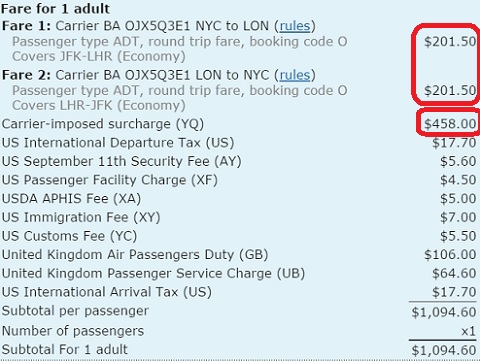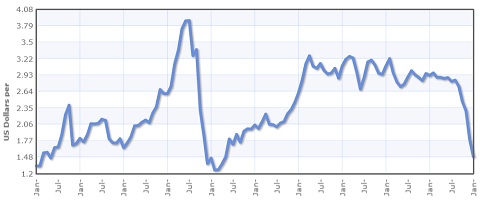I regularly hate on fuel surcharges. They’re bogus fees that have nothing to do with the cost of fuel. A full transatlantic flight – or even one 3/4ths full – will generally cover more than the full cost of gas at current prices with the surcharges alone. And surcharges are ostensibly just meant to cover the increasing cost of fuel, not the total cost and certainly not to generate a profit.
Who Should Care About Fuel Surcharges — and Who Shouldn’t
The only people who should worry about fuel surcharges are corporate travel buyers and award passengers. The median passenger pays a price for their ticket that’s based on supply of available seats and demand for those seats, not based on cost. Fuel surcharges are being used as a mechanism to raise and lower prices across the board in a market without re-filing all the fares in that market. Lowering the fuel surcharge won’t lower the overall price, it will only change the relative components of the price charged (though airlines will claim, implausibly over time, that consumers are getting a better deal whenever they do lower fuel surcharges).
Award passengers care because some frequent flyer programs (mostly those outside the US, though in a few cases American and Delta) add fuel surcharges onto award tickets on the theory that the miles pay for the fare and not taxes and fees.
Corporate travel buyers may care if they’re contracting for travel on the basis of fixed fares or a discount to prevailing fares but with surcharges added on top on a fixed basis.
Are The Current Level of Fuel Surcharges Illegal?
I hadn’t realized, but David Rowell points out, that the DOT issued guidance two years ago indicating that a fuel surcharge has to be described in relation to the actual cost that it’s meant to recover.
Here’s a British Airways New York JFK – London roundtrip fare breakdown. It shows ‘YQ” greater than the fare itself.

But with fuel prices falling, if fuel surcharges don’t fall, there would seem to be prima facie evidence that airlines which haven’t adjusted these fees are acting contrary to this guidance.
However, to the extent that fuel surcharges haven’t risen in some cases in recent years it may be more complicated. It turns out that while we all remember gas prices a year ago or two years ago, the price of jet fuel isn’t really lower than 6 year ago or 10 years ago.
Fuel prices have simply been volatile over the course of 10 years.

A DOT Crackdown on Fuel Surcharges Won’t Change Anything
It’s probably misleading to tell customers that the ‘YQ” component of their tickets is related to the cost of fuel. The Department of Transportation would have a strong case there.
However, it won’t ultimately matter because the solution for airlines would simply be to change the name of the charge so that it’s no longer misleading, rather than to charge less money. Some carriers have been ordered to drop fuel surcharges. And some airlines already call them simply ‘carrier-imposed surcharges’ dropping the fuel pretense.
Nonetheless, I very much resent the junk fees added onto my reward tickets and have great sympathy for the class action lawsuit against British Airways that I believe a couple of readers are involved in.


That DOT guidance did change things – notice YQ is no longer a fuel surcharge but just a ‘carrier imposed surcharge’.
Absolutely. I’d say BA is the ringleader in this department. It is misleading, particularly on award tickets, when novices realize that they need to cough up over $1000 for an award ticket. And you are right that the total cost of the fare isn’t going to change overnight and that oil prices are volatile. I’ve heard estimates that it could be 9-18 months of sustained lower oil prices before we see a drop in JetA. But this Q4 drop was one of the largest decreases in barrel prices in many, many years.
I’m generally opposed to more regulations and more government involvement in pricing, but it seems to me that the correct answer is that the DOT/courts/etc. need to put it in incredibly basic terms: the “fare” has to include everything the airline charges and they can only add other fees and surcharges that they’re collecting for someone else (i.e. gov’t and airport passenger fees). Award tickets should only ever require cash outlays for the non-fare items under this definition.
United hasn’t called it a fuel surcharge for years, they just label it an international surcharge. I haven’t booked international travel on other carriers so I don’t know what they call it, but I can only think they are smart enough to not call them fuel surcharges.
On the upside, by keeping the yq significant we can continue to look for fuel dump fares. ;-D
Until recently the cost of moving perishable goods has become cheaper. Anyone noticed savings at the supermarket or your favorite restaurant. To be honest, it’s not only BA; but also the UK and the USA shaking down the passengers.